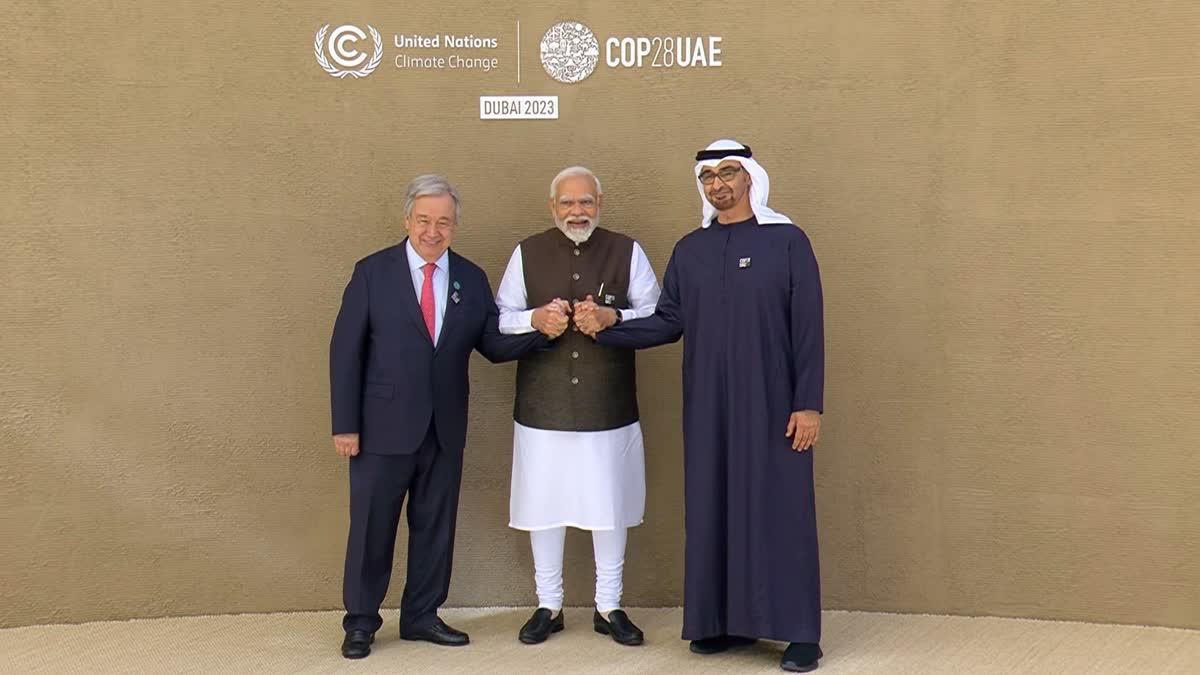New Delhi: India is currently attending the UAE hosted UN Climate Change Conference (COP28) and its role in the COP28 is very crucial this year. The annual summit began on November 20 and will conclude on December 10. More than 70,000 delegates are attending the COP28, with an aim to fast-track energy transition and slash emissions.
Commenting on India's role at COP28, Meena Singh Roy, distinguished researcher and head of the West Asia Centre at the Manohar Parrikar Institute, said, “India can play a phenomenal role as it is one of the biggest and the most developed countries. Also, we are a hub of human resources and India has succeeded in reaching the set target much before time. The initiatives India has taken in terms of the solar alliance, climate change issues, and how we look at the usage of Electric vehicles in the future, are some of the achievements that reflect how crucial India's role at COP28 is. India does have the resources and the political will, not only to declare but also to implement them. There has been greater acceptance of what India has been talking about”.
It is pertinent to note that the G20 New Delhi Leaders Declaration had underlined the need for $5.8-5.9 trillion in the pre-2030 period for developing countries to meet the net zero target. On Thursday, India reiterated its expectation of a clear roadmap on climate financing during the COP28 meeting. In a special press briefing, Foreign Secretary Vinay Kwatra said, “Climate finance and climate technology are a very crucial segment of all the global efforts in addressing this challenge of environmental degradation. We expect a clear roadmap to be agreed at COP28 on climate finance which would be important for delivering on the new, collective, quantified goals”.
Challenges for India at COP28
Being one of the most looked after countries by major countries in the world when it comes to tackling climate issues, India itself has greater challenges to deal with, which could be a point of contention at COP28. As pointed out by Meena Singh Roy, 'the challenges are immense for India and to achieve the sustainable development goal that India has set not only nationally, regionally or globally, is not going to be easy'.
She said, there is a need to address the issues of farmers, which is also a challenge as agriculture remains a livelihood for many people in the country. Governance issues are another challenge that is related to the goals the country has set for itself. There is a need to come up with a middle path to address such challenges”.
It is important to note that India is responsible for high methane emissions, especially from the agricultural sector, and cutting down on methane emissions for India is a challenge. Apart from Agriculture, oil and gas and waste/garbage are also equally responsible for methane emissions in the country. Besides that, phasing out fossil fuels is another big risk for developing countries like India. On Thursday, India's Foreign Secretary Vinay Kwatra said coal is and will remain an important part of India's energy mix regarding development needs. He underscored its commitment to the use of fossil fuels as the U.N.'s COP28 climate summit opens in Dubai.
Also read:COP28 2023: PM Modi says rising ambitions on climate action must see matching progress in climate finance
Meanwhile, the OPEC+ countries agreed to voluntarily cut oil production by a total of 2.2 million barrels per day in the first quarter of 2024 and this could impact countries like India- a country largely dependent on imports to fulfill its energy needs. Commenting on the development, West Asia expert Meena Singh said, “OPEC will do what is in its interest but there is a need to have a consumer group that should set its own rules and regulations. The oil oil-consuming countries have to stay united and come up with their propositions and India could take a lead in that”.
“Geopolitics, strategic surprises, the burden-sharing issues and deteriorating economies of the countries and the diversification on new energy gain, which we are witnessing today, will have an impact on the issues of the energy crisis that we are talking about today. There is a need for India to find alternative ways and simultaneously, we are working towards renewable energy and how viable would that be”, she added.
COP28 will also provide an opportunity to review progress made under the Paris Agreement and chart a path for future courses on climate action. At the Voice of Global South Summit convened by India, the Global South spoke for the need for climate action based on the principles of equity, climate justice, and common but differentiated responsibilities, as well as a greater focus on adaptation.
“It is important that efforts of the developing world be supported with adequate climate financing and technology transfer. They must have access to equitable carbon and development space to achieve sustainable development. India has walked the talk when it comes to climate action.
Our achievements in different sectors like renewable energy, energy efficiency, afforestation, energy conservation, Mission LiFE are testament to the commitment of our people towards mother Earth”, PM Modi had said ahead of his departure for UAE.
